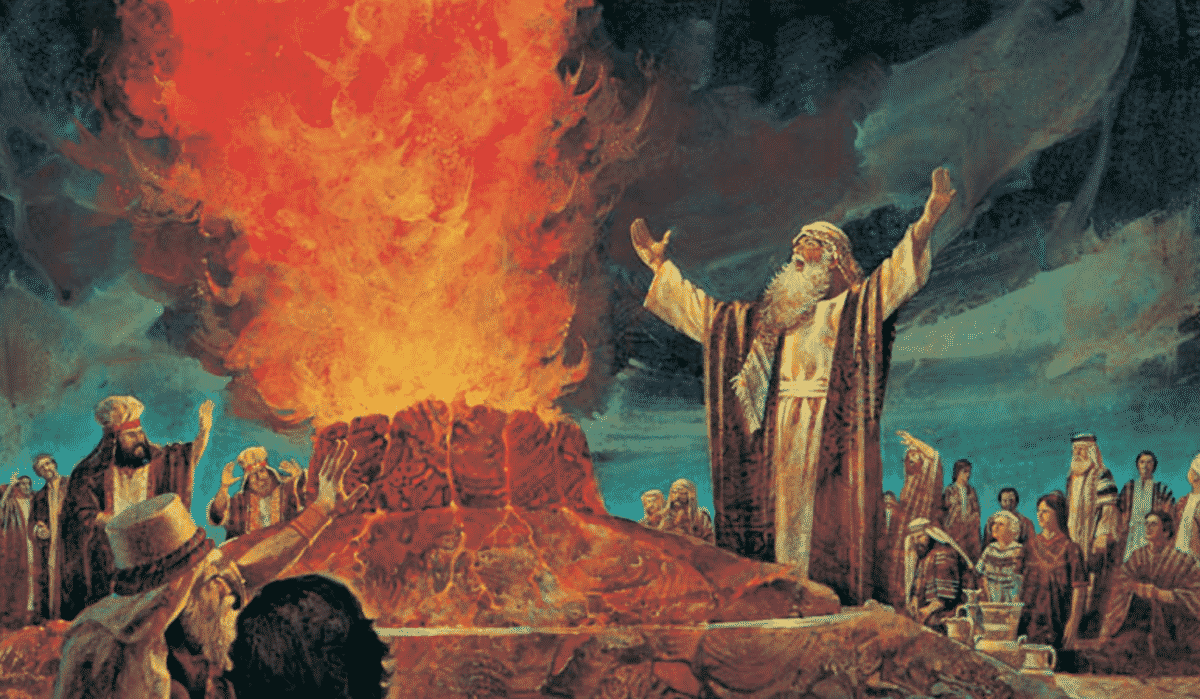Triple baptism and Pentecost’s baptism of fire are prefigured in Elijah’s challenge by fire to the 450 prophets of Baal. Here’s the account from 1 King 18 and I’ll note the important features as you read through it:
30 Then Eli′jah said to all the people, “Come near to me”; and all the people came near to him. And he repaired the altar of the Lord that had been thrown down; 31 Eli′jah took twelve stones [prefigures the 12 Apostles], according to the number of the tribes of the sons of Jacob, to whom the word of the Lord came, saying, “Israel shall be your name”; 32 and with the stones he built an altar in the name of the Lord. And he made a trench about the altar, as great as would contain two measures of seed [2 measures of seed comes again with Elisha as a prophetic sign in 2 Kings 7]. 33 And he put the wood in order, and cut the bull in pieces and laid it on the wood. And he said, “Fill four jars with water, and pour it on the burnt offering, and on the wood.” 34 And he said, “Do it a second time”; and they did it a second time. And he said, “Do it a third time”; and they did it a third time [triple pouring on the sacrifice with water – as a kind of baptism]. 35 And the water ran round about the altar, and filled the trench also with water.
36 And at the time of the offering of the oblation, Elijah the prophet came near and said, “O Lord, God of Abraham, Isaac, and Israel, let it be known this day that thou art God in Israel, and that I am thy servant, and that I have done all these things at thy word. 37 Answer me, O Lord, answer me, that this people may know that thou, O Lord, art God, and that thou hast turned their hearts back.” 38 Then the fire of the Lord fell, and consumed the burnt offering, and the wood, and the stones, and the dust, and licked up the water that was in the trench. [here we have a prefigurement of Pentecost with the fire coming down from Heaven upon the “baptized sacrifice”] 39 And when all the people saw it, they fell on their faces; and they said, “The Lord, he is God; the Lord, he is God.” 40 And Elijah said to them, “Seize the prophets of Ba′al; let not one of them escape.” And they seized them; and Elijah brought them down to the brook Kishon, and killed them there.
The Church East and West conforms to a triple affusion (pouring) or triple immersion (dunking) with the recognition of the three Divine Persons of the Trinity. Prophetically, Elijah has the attendants pour water on the slaughtered sacrifice three times. It’s also no accident that Saint John the Baptist was the “new Elijah” teaching a new baptism.
Elijah poured water on the sacrifice to show that God’s fire is so hot and powerful that water cannot prevent it from burning the sacrifice.
I recently spoke of the life of the follower of Jesus as “being on sacrificial fire” (click here to read “Do you have fire in your soul?”). You may also want to listen to my presentation on on the apocryphal 1 Enoch and Tongues of fire here.
There is a connection between the mystery of water (baptism in Christ) and the mystery of fire (confirmation or chrismation in Christ), as Saint John the Baptist relates in his speaking of baptism by water and fire.
We do this every day. We wash our food and then we place it in the fire. When you slaughter animals, you wash the meat and then cook it. The many mikvehs of the Old Covenant were washings to prepare the believer for becoming a burnt sacrifice for God.
Hence, Christ’s baptism is a preparation for His burnt sacrifice (crucifixion, resurrection, ascension, pentecost).
The priest washes his hands ceremonially because his hands are about to hold the burning coal of the sacrificial body of Christ.
In the Solemn High Mass (pre 1970), the priest sprinkled the faithful in the pews – to prepare them to become a burning sacrifice.
And of course, we will all be “salted with fire” when we die. It’s just a matter of whether we burn in this life (as sacrificial love) or burn some in the next age (in the purgatorial fires of 1 Cor 3:15).
Make your life into a bonfire.
Godspeed,
Taylor
PS: If you want to learn more about Old Testament and Jewish origins of Catholic sacraments and Catholic theology, check out my book The Crucified Rabbi: Judaism and the Origins of Catholicism.



Comments Policy: I reserve the right to delete comments that are offensive or off-topic. If your comment contains a hyperlink to another site, your comment automatically goes into "Comments Purgatory" where it waits for release by way of moderation.